Exploring the Education System in Australian Society: An Evaluation
VerifiedAdded on 2023/03/31
|7
|1270
|164
Essay
AI Summary
This essay provides a comprehensive overview of the education system in Australian society. It begins by outlining the framework, including early childhood learning through tertiary education, and the roles of state and territory governments. The essay then delves into the theoretical underpinnings, emphasizing socio-cultural and cognitive perspectives, and discusses various factors influencing education, such as marginalization and language barriers. The impact of the education system is evaluated, highlighting its role in individual development, democratic society, and economic productivity, while also acknowledging potential challenges like increased competition in the labor market. The essay concludes by emphasizing the significance of education in shaping Australian society.
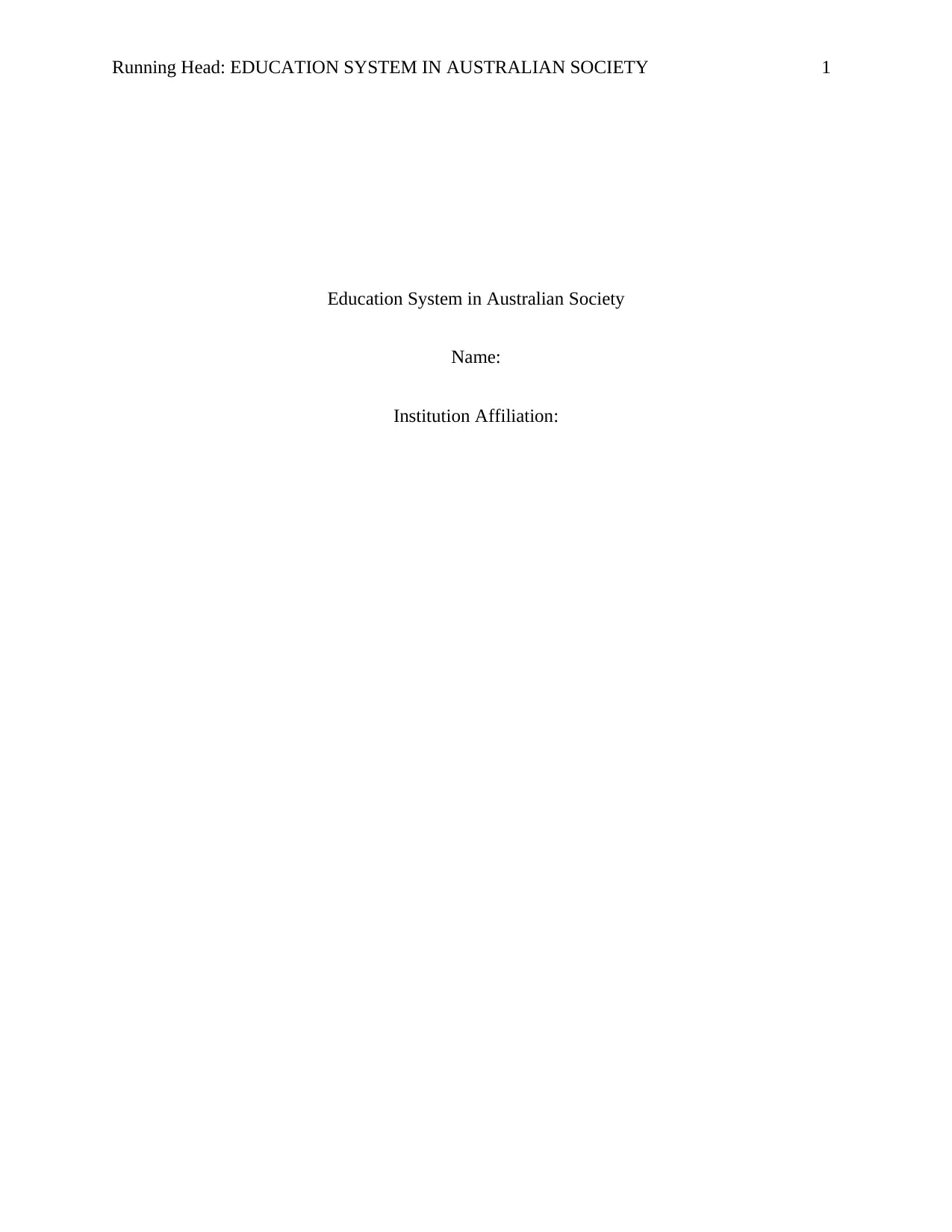
Running Head: EDUCATION SYSTEM IN AUSTRALIAN SOCIETY 1
Education System in Australian Society
Name:
Institution Affiliation:
Education System in Australian Society
Name:
Institution Affiliation:
Paraphrase This Document
Need a fresh take? Get an instant paraphrase of this document with our AI Paraphraser
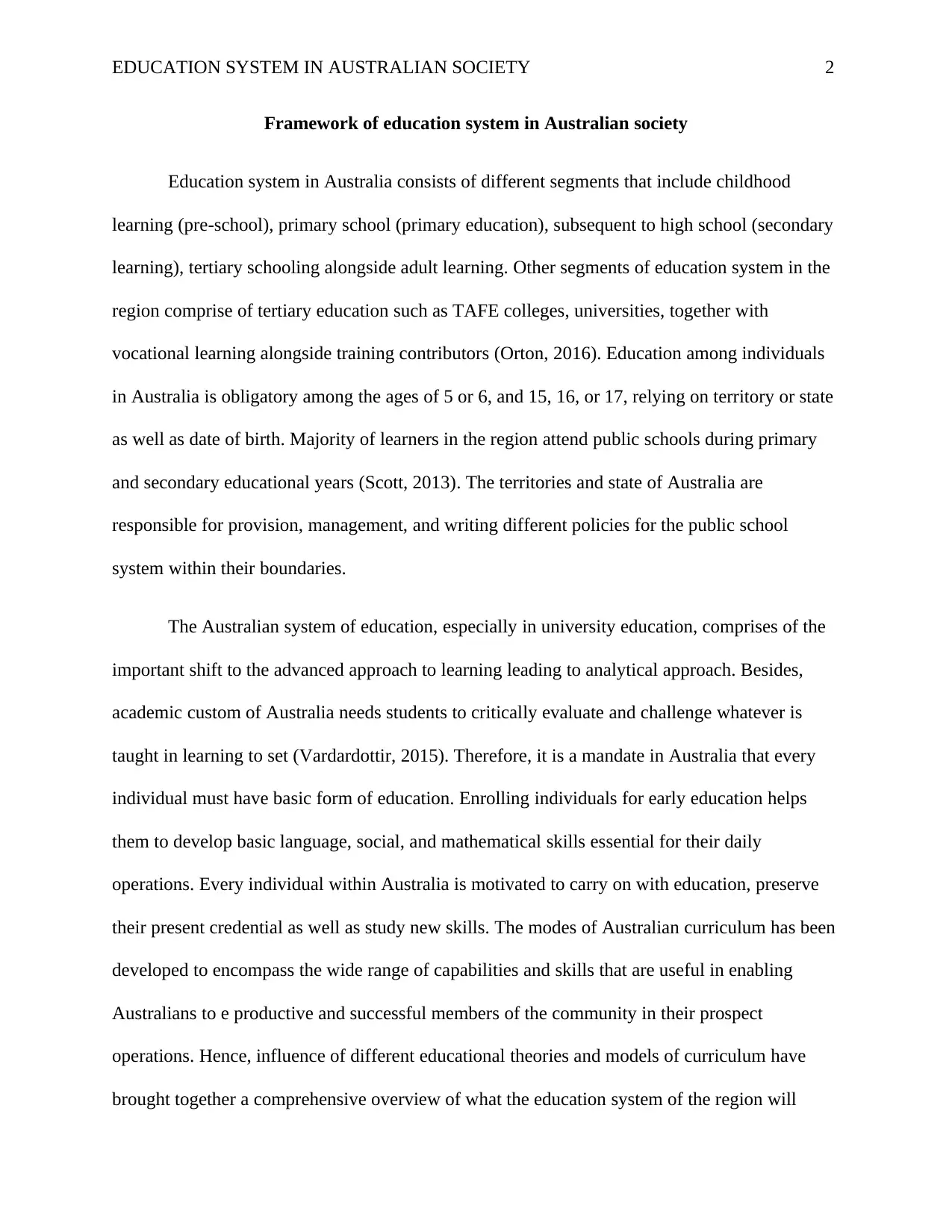
EDUCATION SYSTEM IN AUSTRALIAN SOCIETY 2
Framework of education system in Australian society
Education system in Australia consists of different segments that include childhood
learning (pre-school), primary school (primary education), subsequent to high school (secondary
learning), tertiary schooling alongside adult learning. Other segments of education system in the
region comprise of tertiary education such as TAFE colleges, universities, together with
vocational learning alongside training contributors (Orton, 2016). Education among individuals
in Australia is obligatory among the ages of 5 or 6, and 15, 16, or 17, relying on territory or state
as well as date of birth. Majority of learners in the region attend public schools during primary
and secondary educational years (Scott, 2013). The territories and state of Australia are
responsible for provision, management, and writing different policies for the public school
system within their boundaries.
The Australian system of education, especially in university education, comprises of the
important shift to the advanced approach to learning leading to analytical approach. Besides,
academic custom of Australia needs students to critically evaluate and challenge whatever is
taught in learning to set (Vardardottir, 2015). Therefore, it is a mandate in Australia that every
individual must have basic form of education. Enrolling individuals for early education helps
them to develop basic language, social, and mathematical skills essential for their daily
operations. Every individual within Australia is motivated to carry on with education, preserve
their present credential as well as study new skills. The modes of Australian curriculum has been
developed to encompass the wide range of capabilities and skills that are useful in enabling
Australians to e productive and successful members of the community in their prospect
operations. Hence, influence of different educational theories and models of curriculum have
brought together a comprehensive overview of what the education system of the region will
Framework of education system in Australian society
Education system in Australia consists of different segments that include childhood
learning (pre-school), primary school (primary education), subsequent to high school (secondary
learning), tertiary schooling alongside adult learning. Other segments of education system in the
region comprise of tertiary education such as TAFE colleges, universities, together with
vocational learning alongside training contributors (Orton, 2016). Education among individuals
in Australia is obligatory among the ages of 5 or 6, and 15, 16, or 17, relying on territory or state
as well as date of birth. Majority of learners in the region attend public schools during primary
and secondary educational years (Scott, 2013). The territories and state of Australia are
responsible for provision, management, and writing different policies for the public school
system within their boundaries.
The Australian system of education, especially in university education, comprises of the
important shift to the advanced approach to learning leading to analytical approach. Besides,
academic custom of Australia needs students to critically evaluate and challenge whatever is
taught in learning to set (Vardardottir, 2015). Therefore, it is a mandate in Australia that every
individual must have basic form of education. Enrolling individuals for early education helps
them to develop basic language, social, and mathematical skills essential for their daily
operations. Every individual within Australia is motivated to carry on with education, preserve
their present credential as well as study new skills. The modes of Australian curriculum has been
developed to encompass the wide range of capabilities and skills that are useful in enabling
Australians to e productive and successful members of the community in their prospect
operations. Hence, influence of different educational theories and models of curriculum have
brought together a comprehensive overview of what the education system of the region will
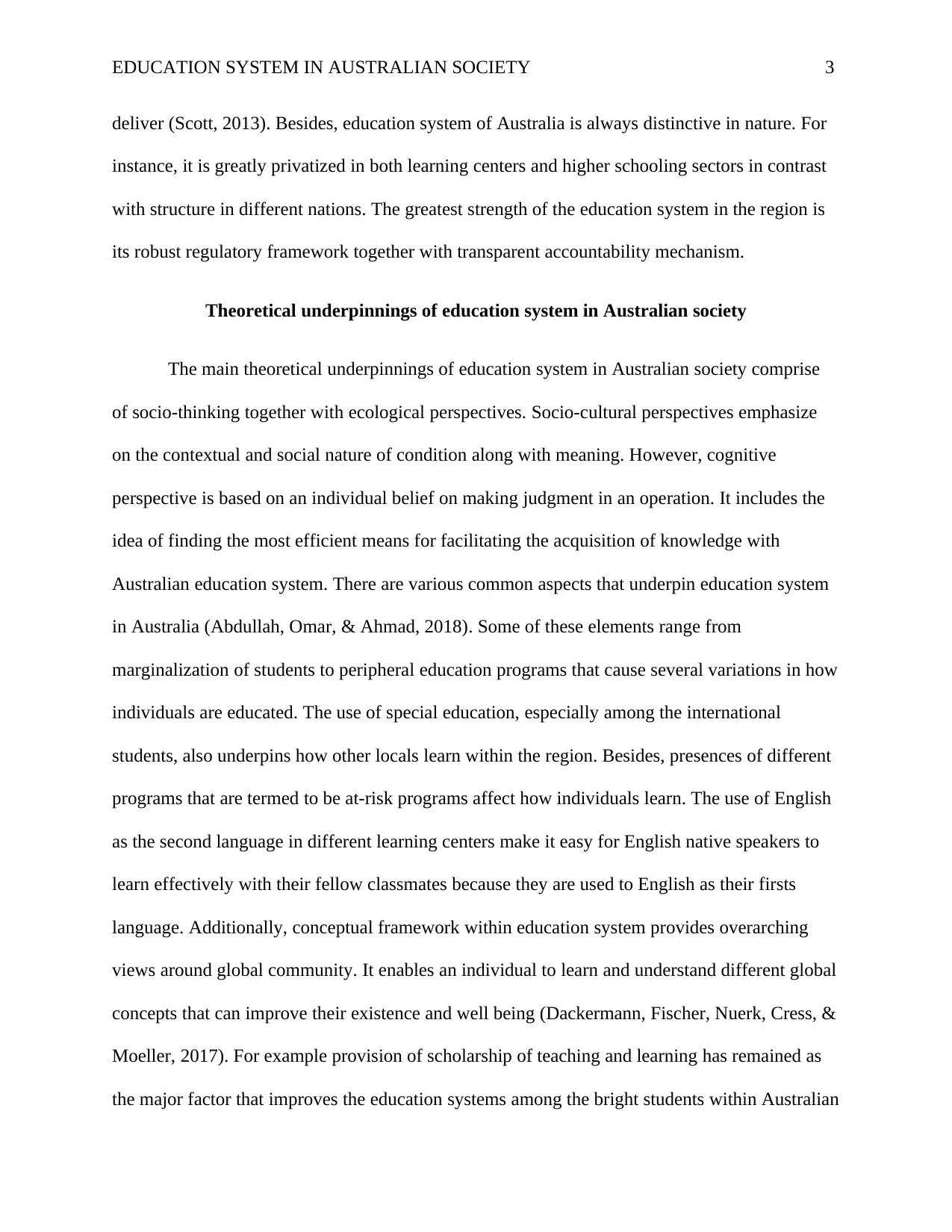
EDUCATION SYSTEM IN AUSTRALIAN SOCIETY 3
deliver (Scott, 2013). Besides, education system of Australia is always distinctive in nature. For
instance, it is greatly privatized in both learning centers and higher schooling sectors in contrast
with structure in different nations. The greatest strength of the education system in the region is
its robust regulatory framework together with transparent accountability mechanism.
Theoretical underpinnings of education system in Australian society
The main theoretical underpinnings of education system in Australian society comprise
of socio-thinking together with ecological perspectives. Socio-cultural perspectives emphasize
on the contextual and social nature of condition along with meaning. However, cognitive
perspective is based on an individual belief on making judgment in an operation. It includes the
idea of finding the most efficient means for facilitating the acquisition of knowledge with
Australian education system. There are various common aspects that underpin education system
in Australia (Abdullah, Omar, & Ahmad, 2018). Some of these elements range from
marginalization of students to peripheral education programs that cause several variations in how
individuals are educated. The use of special education, especially among the international
students, also underpins how other locals learn within the region. Besides, presences of different
programs that are termed to be at-risk programs affect how individuals learn. The use of English
as the second language in different learning centers make it easy for English native speakers to
learn effectively with their fellow classmates because they are used to English as their firsts
language. Additionally, conceptual framework within education system provides overarching
views around global community. It enables an individual to learn and understand different global
concepts that can improve their existence and well being (Dackermann, Fischer, Nuerk, Cress, &
Moeller, 2017). For example provision of scholarship of teaching and learning has remained as
the major factor that improves the education systems among the bright students within Australian
deliver (Scott, 2013). Besides, education system of Australia is always distinctive in nature. For
instance, it is greatly privatized in both learning centers and higher schooling sectors in contrast
with structure in different nations. The greatest strength of the education system in the region is
its robust regulatory framework together with transparent accountability mechanism.
Theoretical underpinnings of education system in Australian society
The main theoretical underpinnings of education system in Australian society comprise
of socio-thinking together with ecological perspectives. Socio-cultural perspectives emphasize
on the contextual and social nature of condition along with meaning. However, cognitive
perspective is based on an individual belief on making judgment in an operation. It includes the
idea of finding the most efficient means for facilitating the acquisition of knowledge with
Australian education system. There are various common aspects that underpin education system
in Australia (Abdullah, Omar, & Ahmad, 2018). Some of these elements range from
marginalization of students to peripheral education programs that cause several variations in how
individuals are educated. The use of special education, especially among the international
students, also underpins how other locals learn within the region. Besides, presences of different
programs that are termed to be at-risk programs affect how individuals learn. The use of English
as the second language in different learning centers make it easy for English native speakers to
learn effectively with their fellow classmates because they are used to English as their firsts
language. Additionally, conceptual framework within education system provides overarching
views around global community. It enables an individual to learn and understand different global
concepts that can improve their existence and well being (Dackermann, Fischer, Nuerk, Cress, &
Moeller, 2017). For example provision of scholarship of teaching and learning has remained as
the major factor that improves the education systems among the bright students within Australian
⊘ This is a preview!⊘
Do you want full access?
Subscribe today to unlock all pages.

Trusted by 1+ million students worldwide
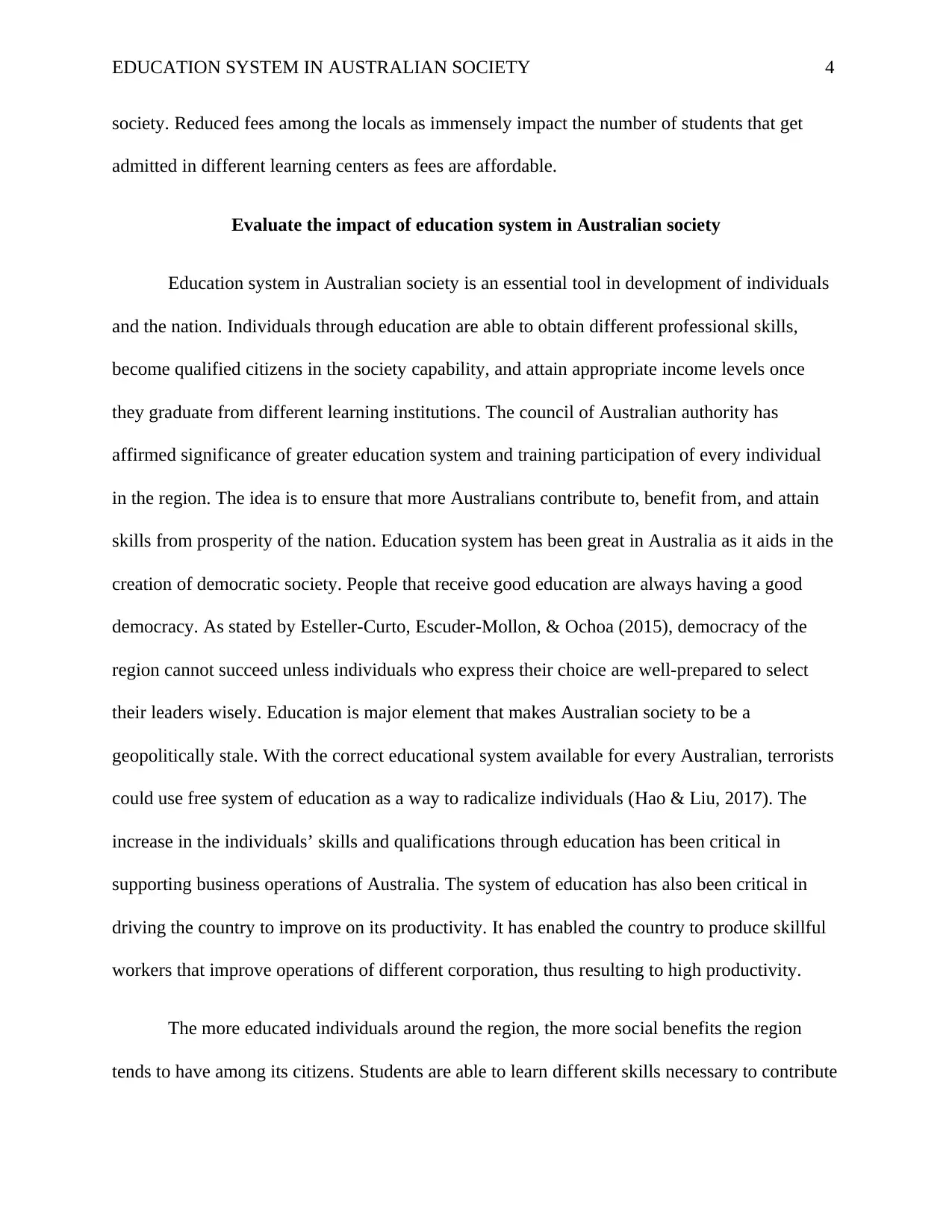
EDUCATION SYSTEM IN AUSTRALIAN SOCIETY 4
society. Reduced fees among the locals as immensely impact the number of students that get
admitted in different learning centers as fees are affordable.
Evaluate the impact of education system in Australian society
Education system in Australian society is an essential tool in development of individuals
and the nation. Individuals through education are able to obtain different professional skills,
become qualified citizens in the society capability, and attain appropriate income levels once
they graduate from different learning institutions. The council of Australian authority has
affirmed significance of greater education system and training participation of every individual
in the region. The idea is to ensure that more Australians contribute to, benefit from, and attain
skills from prosperity of the nation. Education system has been great in Australia as it aids in the
creation of democratic society. People that receive good education are always having a good
democracy. As stated by Esteller-Curto, Escuder-Mollon, & Ochoa (2015), democracy of the
region cannot succeed unless individuals who express their choice are well-prepared to select
their leaders wisely. Education is major element that makes Australian society to be a
geopolitically stale. With the correct educational system available for every Australian, terrorists
could use free system of education as a way to radicalize individuals (Hao & Liu, 2017). The
increase in the individuals’ skills and qualifications through education has been critical in
supporting business operations of Australia. The system of education has also been critical in
driving the country to improve on its productivity. It has enabled the country to produce skillful
workers that improve operations of different corporation, thus resulting to high productivity.
The more educated individuals around the region, the more social benefits the region
tends to have among its citizens. Students are able to learn different skills necessary to contribute
society. Reduced fees among the locals as immensely impact the number of students that get
admitted in different learning centers as fees are affordable.
Evaluate the impact of education system in Australian society
Education system in Australian society is an essential tool in development of individuals
and the nation. Individuals through education are able to obtain different professional skills,
become qualified citizens in the society capability, and attain appropriate income levels once
they graduate from different learning institutions. The council of Australian authority has
affirmed significance of greater education system and training participation of every individual
in the region. The idea is to ensure that more Australians contribute to, benefit from, and attain
skills from prosperity of the nation. Education system has been great in Australia as it aids in the
creation of democratic society. People that receive good education are always having a good
democracy. As stated by Esteller-Curto, Escuder-Mollon, & Ochoa (2015), democracy of the
region cannot succeed unless individuals who express their choice are well-prepared to select
their leaders wisely. Education is major element that makes Australian society to be a
geopolitically stale. With the correct educational system available for every Australian, terrorists
could use free system of education as a way to radicalize individuals (Hao & Liu, 2017). The
increase in the individuals’ skills and qualifications through education has been critical in
supporting business operations of Australia. The system of education has also been critical in
driving the country to improve on its productivity. It has enabled the country to produce skillful
workers that improve operations of different corporation, thus resulting to high productivity.
The more educated individuals around the region, the more social benefits the region
tends to have among its citizens. Students are able to learn different skills necessary to contribute
Paraphrase This Document
Need a fresh take? Get an instant paraphrase of this document with our AI Paraphraser
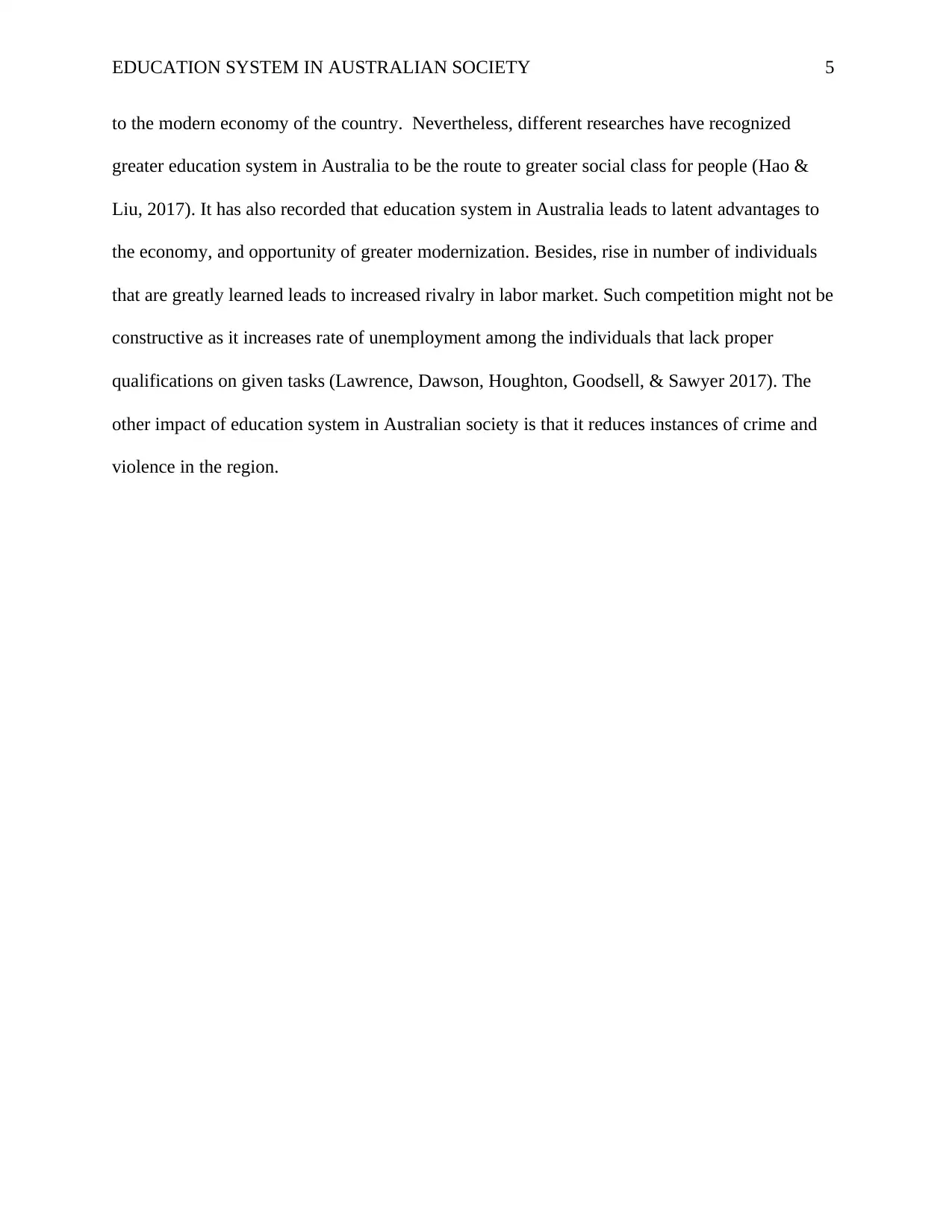
EDUCATION SYSTEM IN AUSTRALIAN SOCIETY 5
to the modern economy of the country. Nevertheless, different researches have recognized
greater education system in Australia to be the route to greater social class for people (Hao &
Liu, 2017). It has also recorded that education system in Australia leads to latent advantages to
the economy, and opportunity of greater modernization. Besides, rise in number of individuals
that are greatly learned leads to increased rivalry in labor market. Such competition might not be
constructive as it increases rate of unemployment among the individuals that lack proper
qualifications on given tasks (Lawrence, Dawson, Houghton, Goodsell, & Sawyer 2017). The
other impact of education system in Australian society is that it reduces instances of crime and
violence in the region.
to the modern economy of the country. Nevertheless, different researches have recognized
greater education system in Australia to be the route to greater social class for people (Hao &
Liu, 2017). It has also recorded that education system in Australia leads to latent advantages to
the economy, and opportunity of greater modernization. Besides, rise in number of individuals
that are greatly learned leads to increased rivalry in labor market. Such competition might not be
constructive as it increases rate of unemployment among the individuals that lack proper
qualifications on given tasks (Lawrence, Dawson, Houghton, Goodsell, & Sawyer 2017). The
other impact of education system in Australian society is that it reduces instances of crime and
violence in the region.
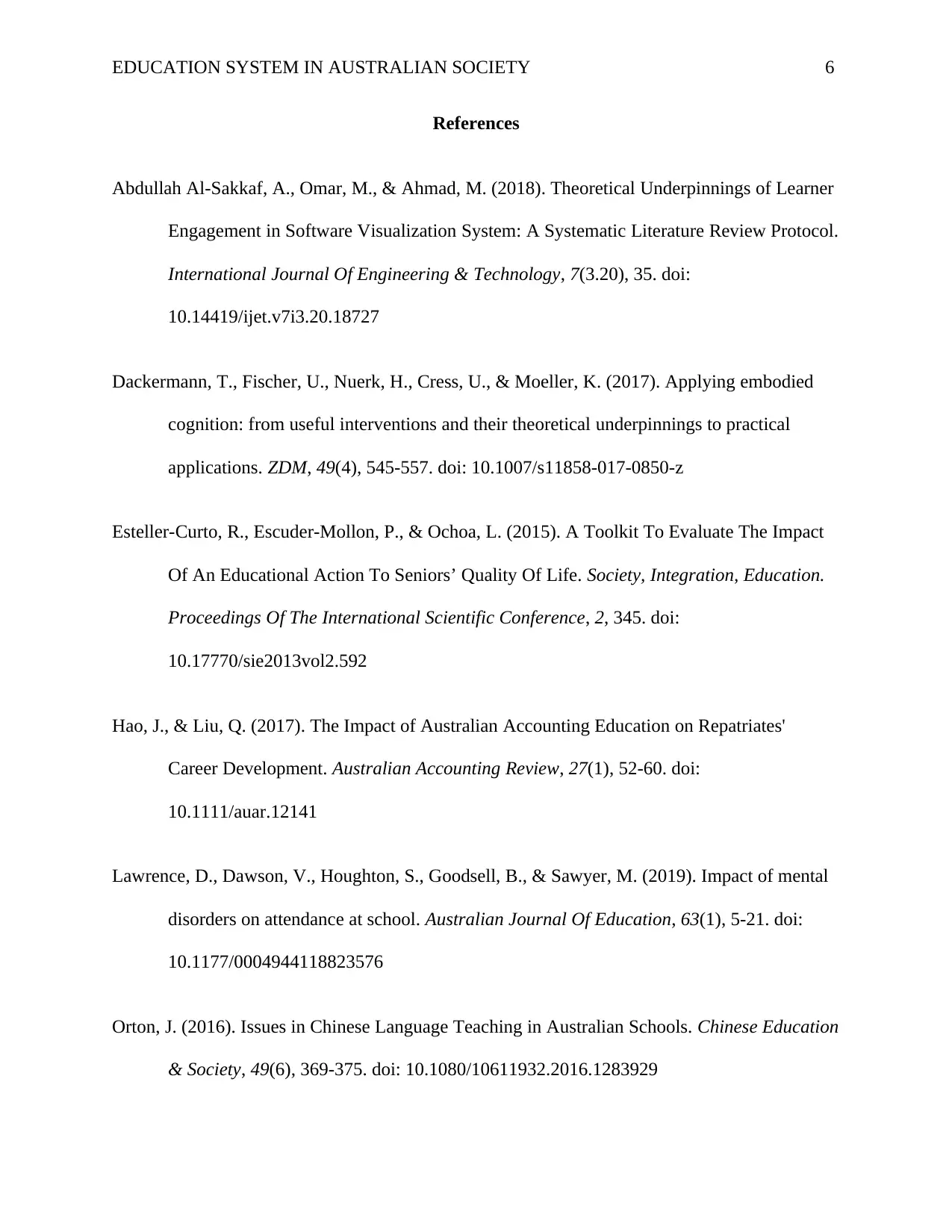
EDUCATION SYSTEM IN AUSTRALIAN SOCIETY 6
References
Abdullah Al-Sakkaf, A., Omar, M., & Ahmad, M. (2018). Theoretical Underpinnings of Learner
Engagement in Software Visualization System: A Systematic Literature Review Protocol.
International Journal Of Engineering & Technology, 7(3.20), 35. doi:
10.14419/ijet.v7i3.20.18727
Dackermann, T., Fischer, U., Nuerk, H., Cress, U., & Moeller, K. (2017). Applying embodied
cognition: from useful interventions and their theoretical underpinnings to practical
applications. ZDM, 49(4), 545-557. doi: 10.1007/s11858-017-0850-z
Esteller-Curto, R., Escuder-Mollon, P., & Ochoa, L. (2015). A Toolkit To Evaluate The Impact
Of An Educational Action To Seniors’ Quality Of Life. Society, Integration, Education.
Proceedings Of The International Scientific Conference, 2, 345. doi:
10.17770/sie2013vol2.592
Hao, J., & Liu, Q. (2017). The Impact of Australian Accounting Education on Repatriates'
Career Development. Australian Accounting Review, 27(1), 52-60. doi:
10.1111/auar.12141
Lawrence, D., Dawson, V., Houghton, S., Goodsell, B., & Sawyer, M. (2019). Impact of mental
disorders on attendance at school. Australian Journal Of Education, 63(1), 5-21. doi:
10.1177/0004944118823576
Orton, J. (2016). Issues in Chinese Language Teaching in Australian Schools. Chinese Education
& Society, 49(6), 369-375. doi: 10.1080/10611932.2016.1283929
References
Abdullah Al-Sakkaf, A., Omar, M., & Ahmad, M. (2018). Theoretical Underpinnings of Learner
Engagement in Software Visualization System: A Systematic Literature Review Protocol.
International Journal Of Engineering & Technology, 7(3.20), 35. doi:
10.14419/ijet.v7i3.20.18727
Dackermann, T., Fischer, U., Nuerk, H., Cress, U., & Moeller, K. (2017). Applying embodied
cognition: from useful interventions and their theoretical underpinnings to practical
applications. ZDM, 49(4), 545-557. doi: 10.1007/s11858-017-0850-z
Esteller-Curto, R., Escuder-Mollon, P., & Ochoa, L. (2015). A Toolkit To Evaluate The Impact
Of An Educational Action To Seniors’ Quality Of Life. Society, Integration, Education.
Proceedings Of The International Scientific Conference, 2, 345. doi:
10.17770/sie2013vol2.592
Hao, J., & Liu, Q. (2017). The Impact of Australian Accounting Education on Repatriates'
Career Development. Australian Accounting Review, 27(1), 52-60. doi:
10.1111/auar.12141
Lawrence, D., Dawson, V., Houghton, S., Goodsell, B., & Sawyer, M. (2019). Impact of mental
disorders on attendance at school. Australian Journal Of Education, 63(1), 5-21. doi:
10.1177/0004944118823576
Orton, J. (2016). Issues in Chinese Language Teaching in Australian Schools. Chinese Education
& Society, 49(6), 369-375. doi: 10.1080/10611932.2016.1283929
⊘ This is a preview!⊘
Do you want full access?
Subscribe today to unlock all pages.

Trusted by 1+ million students worldwide
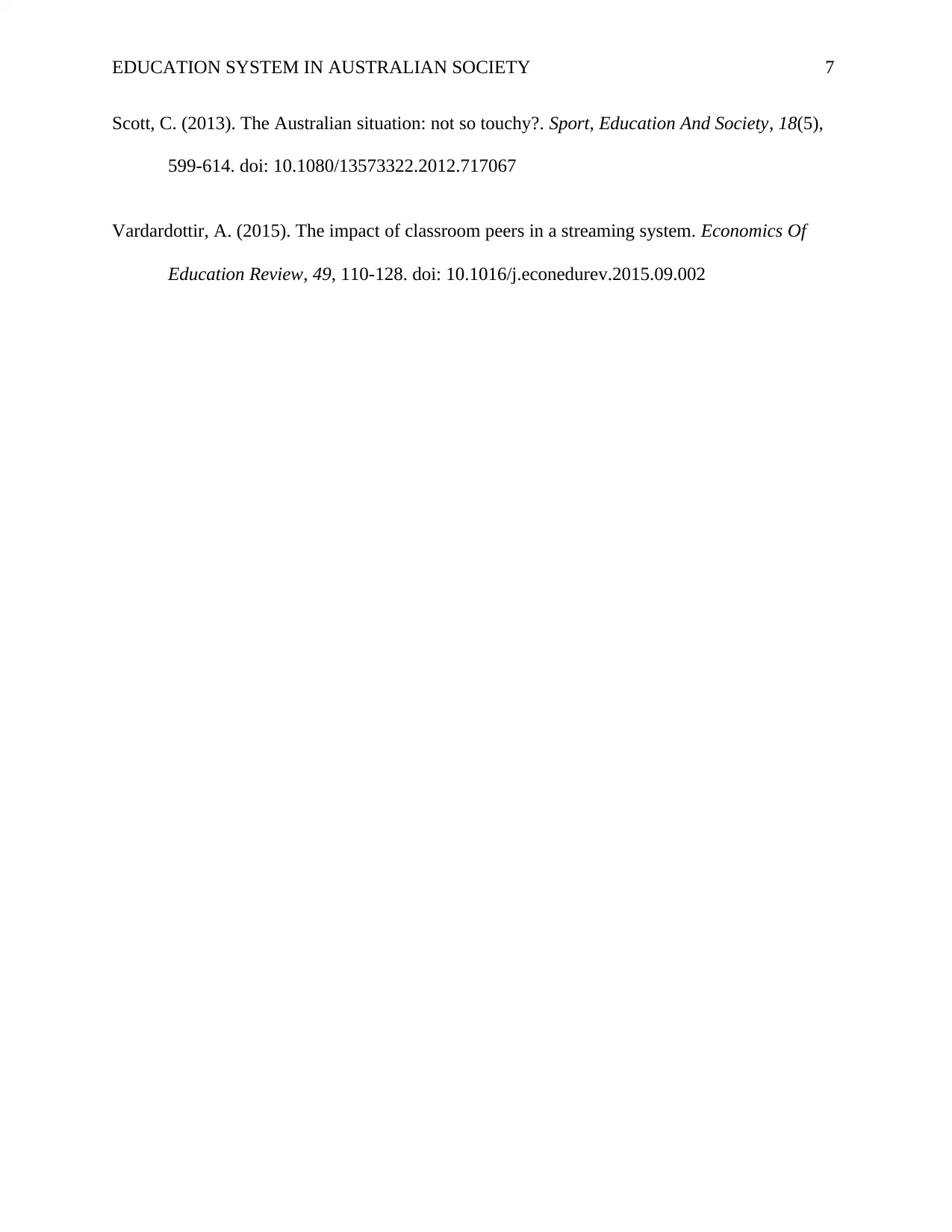
EDUCATION SYSTEM IN AUSTRALIAN SOCIETY 7
Scott, C. (2013). The Australian situation: not so touchy?. Sport, Education And Society, 18(5),
599-614. doi: 10.1080/13573322.2012.717067
Vardardottir, A. (2015). The impact of classroom peers in a streaming system. Economics Of
Education Review, 49, 110-128. doi: 10.1016/j.econedurev.2015.09.002
Scott, C. (2013). The Australian situation: not so touchy?. Sport, Education And Society, 18(5),
599-614. doi: 10.1080/13573322.2012.717067
Vardardottir, A. (2015). The impact of classroom peers in a streaming system. Economics Of
Education Review, 49, 110-128. doi: 10.1016/j.econedurev.2015.09.002
1 out of 7
Related Documents
Your All-in-One AI-Powered Toolkit for Academic Success.
+13062052269
info@desklib.com
Available 24*7 on WhatsApp / Email
![[object Object]](/_next/static/media/star-bottom.7253800d.svg)
Unlock your academic potential
Copyright © 2020–2026 A2Z Services. All Rights Reserved. Developed and managed by ZUCOL.



